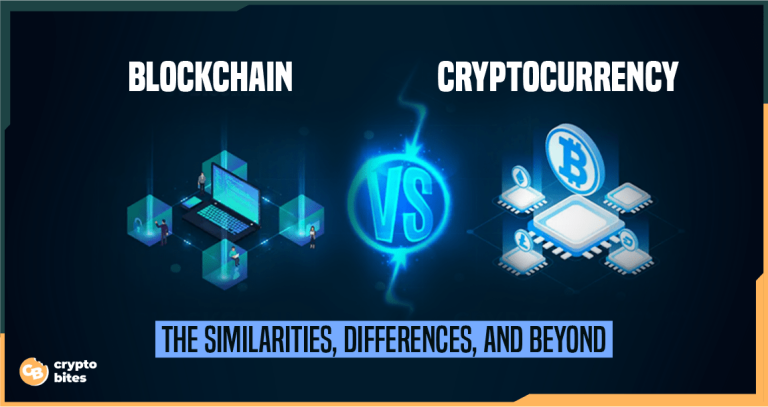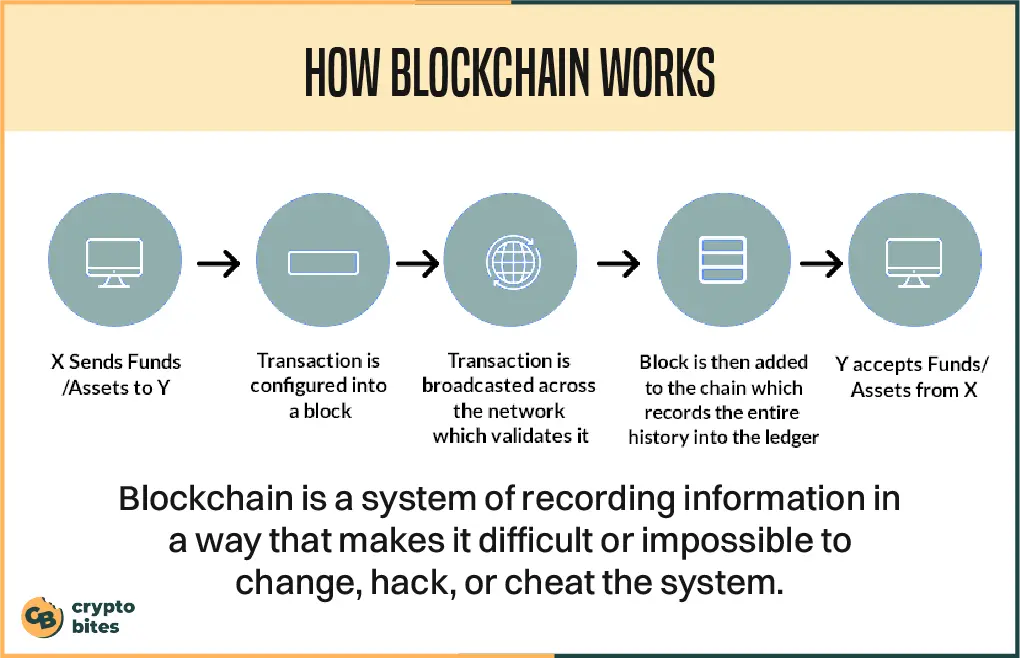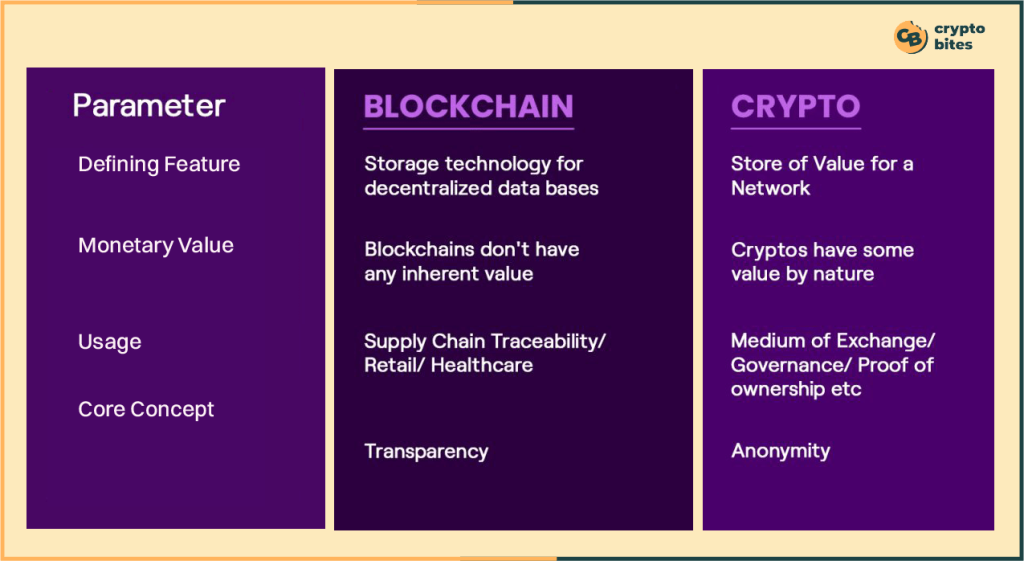
Blockchain VS Cryptocurrency- The Similarities, Differences, And Beyond
Despite being closely interconnected, Blockchain and Cryptocurrency are two standalone digital innovations of recent times. The first is the underlying foundation, while the second is one of its implementations.
Blockchain is, basically, a distributed ledger technology (DLT) that powers the transactions of digital assets such as cryptocurrencies.
Unfortunately, they are often misinterpreted as the same, which limits their potential in their respective fields.
So, if you are one of the many who have been using these terms synonymously for years, let’s dig deep into Blockchain vs Cryptocurrency together and figure out how they differ.
Let’s dive right in!
What Is Blockchain?
Blockchain is a decentralized and distributed ledger that records digital transactions transparently.
Unlike a regular spreadsheet, it stores data in blocks that are shared across multiple computers at a time.
However, the core concept of blockchain technology is decentralized data distribution within the network by enhancing security, immutability, and transparency. But how does it do so?
Well, in this advanced database, entries cannot be changed, modified, or deleted as data is not stored on a centralized server, preventing unauthorized access.

This is how a blockchain network works to ensure data integrity-
- Someone adds a new transaction to the blockchain
- The new transaction is transmitted to all the nodes across the network
- After they validate the entry using some set algorithms, it’s preserved in a block along with previous transaction records
- Once a block reaches its storage capacity, it’s linked with already-filled blocks, forming a chain-like feature within the network
- Each block has its own timestamp, making the information permanent in the database
- That’s how the transaction is completed
What Is Cryptocurrency?
Cryptocurrency, at its core, is a digital asset having market value like other currencies. It can work as a medium of exchange, US dollar for instance, and also function as a store of value, similar to storing gold.
Simply speaking, cryptocurrency is a digital currency with monetary value that can facilitate financial transactions.
Secured by cryptography on a decentralized setup called blockchain, it runs on peer-to-peer networking without any third-party intervention, and thus, leverages the underlying blockchain technology for swift, secure, and transparent digital transactions without relying on the traditional banking system.
Bitcoin, the first cryptocurrency, was introduced to the world back in 2009.
Since then, digital currencies have come a long way to reshape the global economic landscape. Due to their growing demand, these virtual currencies were defined as commodities in 2015 by the U.S. Commodity Futures Trading Commission.
How Blockchain And Cryptocurrency Are Connected?
Because the economic prospects for the digital world continue to change, blockchain and cryptocurrency are no longer buzzwords, but facts.
A recent study shows, more than 300 million people use blockchain as a primary database for their business. And currently, there are 9024 cryptocurrencies active in the market accelerating the growth of crypto users by 377% compared to 2021.
The cryptocurrency revenue is expected to reach $51.5 billion by the end of 2024.
But how blockchain and cryptocurrency are connected? Are they interchangeable?
Well, blockchain is the underlying infrastructure to create and operate cryptocurrencies such as Bitcoins, Ether, Litecoins, etc. without the interference of a central authority.
Through its decentralized and immutable nature, blockchain not only records financial transactions but accredits widespread applications in different industries; security, healthcare, governance, and supply chain management, to name a few.
What I mean to say, Blockchain has its independent existence and widespread acceptance of crypto.
Cryptocurrency, on the other hand, is a blockchain-based financial application that runs on top of its decentralized mechanism. It relies on blockchain’s transparent framework to record and verify transactions.
Blockchain, being a shared network of computers, spreads transactions across the network, allowing Bitcoin and other cryptocurrencies to operate without any central authority. Plus, it also benefits crypto buyers and sellers by protecting their financial information and identity.
Therefore, blockchain is the kernel of cryptos to support and validate the exchange of digital currencies, fostering financial autonomy, whereas cryptocurrency is just one decentralized application of blockchain.
You can take real-world monetary transactions for example.
Suppose, you are sending some US dollars to your business partner via a bank. Here the US dollars that get transferred represent virtual currencies, cryptocurrency in general, and the banking system via which dollars are transferred resembles blockchain technology.
I hope it clarifies the intertwined relationship between blockchain and cryptocurrency. They can certainly work together to redefine the realm of digital finance, but cannot be used equivalently.
Similarities Between Blockchain And Cryptocurrency
As we delve into the domain of blockchain and cryptocurrency, we see how these ingenious inventions complement each other through their common features. Let’s point out some of the similarities below-
1. Intangible
Both are intangible, virtual mechanisms having no physical existence.
Blockchain works as a shared database through a decentralized network with no particular physical location. While the cryptos represent intangible virtual tokens that we cannot hold.
2. Interdependent
The interesting fact about blockchain is that it was developed to record Bitcoin transactions, the first-ever digital currency.
Since then, they have been relying on each other for secure and immutable financial data transfer. Blockchain creates the path for crypto transactions and cryptocurrency, on the other side, utilizes that path to be transferred.
3. Technological Advancement
Compared to those age-old spreadsheets, blockchain is far more advanced in digital data sharing and management. Similarly, cryptocurrencies are technologically way ahead of paper-based conventional currencies, fostering limitless global transactions.
These are certainly two major breakthroughs in recent technological innovation.
What Are The Differences Between Blockchain And Cryptocurrency?
At this point, let’s break down the key distinctions that separate blockchain and cryptos-
1. Technology vs Application
As I explained earlier, Blockchain is the underlying technology that offers a transparent and tamper-proof framework for digital data management, be it crypto transfer or intellectual property protection.
Meanwhile, cryptocurrency is one of its major applications, running on the fundamental principles of blockchain to record and verify digital transactions.
2. Monetary Value
One of the major contrasts between these two lies in the fact that blockchain has no monetary value.
Conversely, cryptocurrency represents digital currencies with immense monetary worth. You can even trade these virtual currencies for real-world money or goods. As of February 2024, Crypto’s worldwide market capitalization is estimated at $1.65 trillion.
However, blockchain is the fundamental network that prepares complex mathematical equations to make cryptos worth their financial merit.
3. Mobility
Decentralization, blockchain’s one of the core features, makes this setup widespread throughout the world. So, there’s no central location associated with the network to make it mobile.
On the flip side, it empowers cryptocurrency with mobility to ensure borderless financial transactions. So, if you have a Bitcoin wallet, you can make financial agreements anywhere in the world by transferring the coins.
4. Real-World Use Cases
Although blockchain was basically designed as the central force to operate cryptocurrencies, it is, right now, beyond Bitcoin or other virtual assets. The extensive usage of blockchain technology includes the following industries-
- Finance and Banking
- Healthcare
- Logistics and Supply Chain
- Real Estate
- Education
- Governance etc.
Cryptocurrency, on the other hand, confirms fast and secure digital transactions using blockchain, and therefore, creates endless investment opportunities enabling borderless financial exchange.
Furthermore, they can also buy you real-world goods and services, having monetary value.

5. Regulatory Concerns
While talking about blockchain vs cryptocurrency, it’s essential to note their varying regulatory concerns.
Blockchain, these days, is highly appreciated and widely adopted by different industries, thanks to its unparalleled security, efficiency, and transparency. Cryptocurrency, on the contrary, raised some major security concerns in recent years including money laundering, scamming, ransomware, tax evasion, etc.
Reportedly, crypto users lost $1.8 billion in the year 2023 due to hacks and scams. So, the regulatory approaches to these digital currencies demand more awareness.
6. Transparency vs Anonymity
As we all know, transparency is one of the driving mechanisms of blockchain technology. Being a public ledger, it’s open to anyone within the network.
However, in the realm of cryptocurrency, you are offered anonymity. Though authorized users can access information about a particular transaction, they cannot identify the person behind the transaction.
Blockchain VS Cryptocurrency: Key Differences At A Glance
| Aspect | Blockchain | Cryptocurrency |
| Defining Nature | A decentralized ledger technology that stores data in blocks, forming chains of blocks | A form of digital currency that exists on the principle of blockchain technology |
| Monetary Value | No monetary value | Having monetary value, it can be exchanged for real-world money |
| Mobility | Operates through a decentralized network that is not mobile | Transferable from one account to another |
| Transparency | Highly transparent | Offers anonymous transaction |
| Security Concern | Higher security with fewer risks | Susceptible to potential crypto crimes |
| Applications | Widespread applications in diverse industries | Borderless money exchange to buy, sell, or trade physical/ digital assets |
Conclusion
So, the bottom line of blockchain vs cryptocurrency is, despite being deeply interrelated, they are not interchangeable. These are two different terms having their individual pertinence.
Cryptocurrency is a virtual asset, empowered by blockchain’s fundamental principles. Blockchain, on the other hand, has many other decentralized applications far beyond crypto transactions.
If you can combine these two powerful digital schemes to benefit businesses, they will surely help the global economy reach a new height by reinforcing each other’s capabilities.




